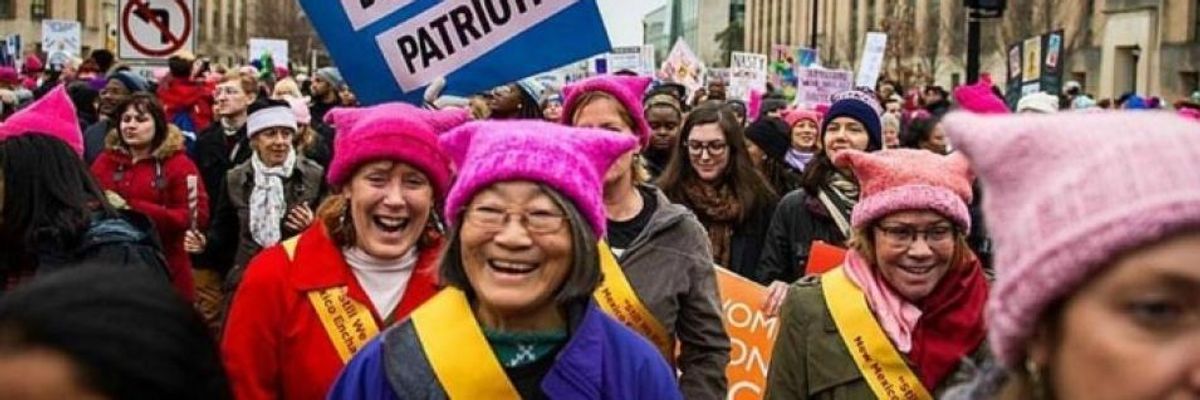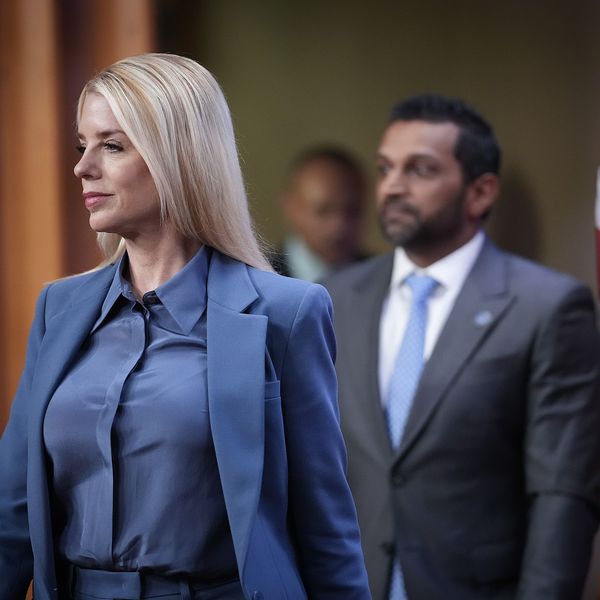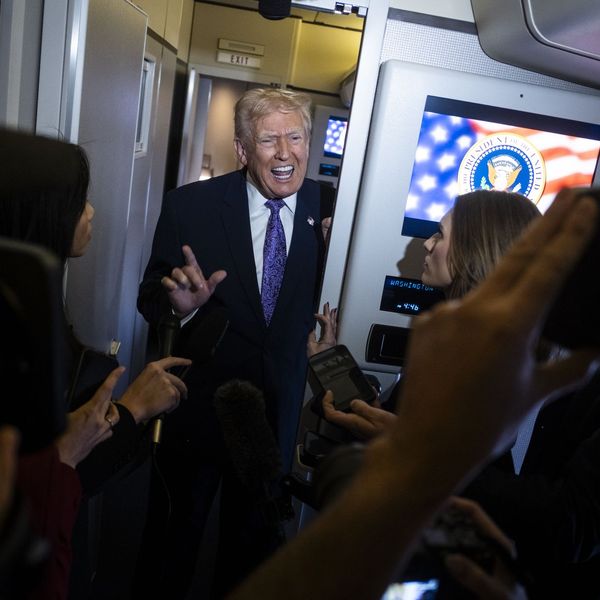
"Online activists exposed the identities of a few white supremacists, leading to charges from local law enforcement due to public pressure. But there have been no felony rioting charges, no charges of guilt-by-association, no police raids, no sweeping investigation." (Photo: ACLU Nationwide/Facebook)
Punishing Dissent in the Age of Trump: What's in a Riot?
Defendants are facing over 60 years in prison.
On the morning of President Trump's Inauguration, police trapped and arrested over 230 people. Some were anti-Trump demonstrators; some were not. The next day, federal prosecutors charged them all with "felony rioting," a nonexistent crime in DC. The prosecution then launched a sweeping investigation into the defendants' lives, demanding vast amounts of online information through secret warrants.
Prosecutors eventually dropped a few defendants, like journalists and legal observers, but simultaneously increased the charges against everyone else. The most recent indictment collectively charged over 200 people with felony rioting, felony incitement to riot, conspiracy to riot, and five property-damage crimes -- all from broken windows. Each defendant is facing over 60 years in prison.
The prosecution next obtained warrants focused on anti-Trump organizers. One sought a list of all visitors to a website that organizers used to promote Inauguration Day protests. A second sought information on all Facebook friends and related communications of two organizers, the host of a coalition Facebook page, and those who simply "liked" that page. Despite legal challenges, a court recently decided to enforce the warrants, requiring only that personally-identifiable information be redacted for "irrelevant" material.
This unprecedented prosecution follows a drastic change in local law enforcement's response to protest. The DC Office of Police Complaints issued a report critical of the mass arrest, noting the departure from Standard Operating Procedure and the likelihood that police lacked individualized probable cause to arrest everyone. This is exactly the type of action new policies and statutes enacted in DC were meant to avoid, following a 2002 mass-arrest that caused the District to pay over $10 million in settlements.
Compare this crackdown to the government's response to the pre-planned, armed violence and rioting by white supremacists and private militia groups in Charlottesville, VA. Instead of a sweeping online dragnet to identify organizers who conspired to plan, promote, and carry out violence in Charlottesville-- violence against people, not property; instead of rounding up participants and charging them with felony conspiracy to commit rioting; and instead of charging all the participants as accessories to Heather Heyer's murder, federal prosecutors have done little to nothing. Online activists exposed the identities of a few white supremacists, leading to charges from local law enforcement due to public pressure. But there have been no felony rioting charges, no charges of guilt-by-association, no police raids, no sweeping investigation.
Other riots have gone unchallenged by law enforcement. In 2006, Steelers fans rioted after their team won the Super Bowl, causing over $150,000 in damage (by comparison, prosecutors allege the inauguration defendants caused an estimated $100,000 of damage on January 20 --most of which was attributable to a limousine fire that occurred after the mass arrest. Police charged some Steelers fans with individualized offenses, but no riot charges. In 2015, University of Kentucky basketball fans rioted after their team lost to Wisconsin; once again, some arrests, but no riot charges.
How do prosecutors decide when to dust off the rioting statutes and whom to charge? Apparently, the reasons for the alleged rioting are important. Sports riots are "people letting off steam." Riots by white supremacists evidently occur with no criminal consequences. And why should law enforcement behave differently? Neither scenario threatens the state itself. When people stand in opposition to the government, like the demonstrators did on January 20, the analysis changes; suddenly conduct becomes "rioting," deserving of a lifetime in prison.
This is classic content-based discrimination of freedom of speech and assembly, and selective prosecution; the state cracks down when it disapproves of the reasons why a riot occurs, but holds back when rioters are not responding to state violence and oppression. Notably, the first time prosecutors used the riot statutes in DC was to punish protestors following Martin Luther King Jr.'s assassination.
All this raises the questions--who gets to define "violence," and what of the permissibility of state-sanctioned violence? Does the state not commit violence when it brutally attacks anti-Trump protesters and arrests them without probable cause? Does the state not commit violence by trying to put hundreds of people behind bars for decades? Does the state not commit violence by failing to intervene against armed force exacted by white supremacists? Does the state not commit violence when it protects hate speech and punishes government critics?
Trials for the inauguration protesters begin mid-November and will continue for a year. As media ramps up coverage, do not forget what these trials are about--not rioting, not broken windows, but punishing dissent.
An Urgent Message From Our Co-Founder
Dear Common Dreams reader, The U.S. is on a fast track to authoritarianism like nothing I've ever seen. Meanwhile, corporate news outlets are utterly capitulating to Trump, twisting their coverage to avoid drawing his ire while lining up to stuff cash in his pockets. That's why I believe that Common Dreams is doing the best and most consequential reporting that we've ever done. Our small but mighty team is a progressive reporting powerhouse, covering the news every day that the corporate media never will. Our mission has always been simple: To inform. To inspire. And to ignite change for the common good. Now here's the key piece that I want all our readers to understand: None of this would be possible without your financial support. That's not just some fundraising cliche. It's the absolute and literal truth. We don't accept corporate advertising and never will. We don't have a paywall because we don't think people should be blocked from critical news based on their ability to pay. Everything we do is funded by the donations of readers like you. Will you donate now to help power the nonprofit, independent reporting of Common Dreams? Thank you for being a vital member of our community. Together, we can keep independent journalism alive when it’s needed most. - Craig Brown, Co-founder |
On the morning of President Trump's Inauguration, police trapped and arrested over 230 people. Some were anti-Trump demonstrators; some were not. The next day, federal prosecutors charged them all with "felony rioting," a nonexistent crime in DC. The prosecution then launched a sweeping investigation into the defendants' lives, demanding vast amounts of online information through secret warrants.
Prosecutors eventually dropped a few defendants, like journalists and legal observers, but simultaneously increased the charges against everyone else. The most recent indictment collectively charged over 200 people with felony rioting, felony incitement to riot, conspiracy to riot, and five property-damage crimes -- all from broken windows. Each defendant is facing over 60 years in prison.
The prosecution next obtained warrants focused on anti-Trump organizers. One sought a list of all visitors to a website that organizers used to promote Inauguration Day protests. A second sought information on all Facebook friends and related communications of two organizers, the host of a coalition Facebook page, and those who simply "liked" that page. Despite legal challenges, a court recently decided to enforce the warrants, requiring only that personally-identifiable information be redacted for "irrelevant" material.
This unprecedented prosecution follows a drastic change in local law enforcement's response to protest. The DC Office of Police Complaints issued a report critical of the mass arrest, noting the departure from Standard Operating Procedure and the likelihood that police lacked individualized probable cause to arrest everyone. This is exactly the type of action new policies and statutes enacted in DC were meant to avoid, following a 2002 mass-arrest that caused the District to pay over $10 million in settlements.
Compare this crackdown to the government's response to the pre-planned, armed violence and rioting by white supremacists and private militia groups in Charlottesville, VA. Instead of a sweeping online dragnet to identify organizers who conspired to plan, promote, and carry out violence in Charlottesville-- violence against people, not property; instead of rounding up participants and charging them with felony conspiracy to commit rioting; and instead of charging all the participants as accessories to Heather Heyer's murder, federal prosecutors have done little to nothing. Online activists exposed the identities of a few white supremacists, leading to charges from local law enforcement due to public pressure. But there have been no felony rioting charges, no charges of guilt-by-association, no police raids, no sweeping investigation.
Other riots have gone unchallenged by law enforcement. In 2006, Steelers fans rioted after their team won the Super Bowl, causing over $150,000 in damage (by comparison, prosecutors allege the inauguration defendants caused an estimated $100,000 of damage on January 20 --most of which was attributable to a limousine fire that occurred after the mass arrest. Police charged some Steelers fans with individualized offenses, but no riot charges. In 2015, University of Kentucky basketball fans rioted after their team lost to Wisconsin; once again, some arrests, but no riot charges.
How do prosecutors decide when to dust off the rioting statutes and whom to charge? Apparently, the reasons for the alleged rioting are important. Sports riots are "people letting off steam." Riots by white supremacists evidently occur with no criminal consequences. And why should law enforcement behave differently? Neither scenario threatens the state itself. When people stand in opposition to the government, like the demonstrators did on January 20, the analysis changes; suddenly conduct becomes "rioting," deserving of a lifetime in prison.
This is classic content-based discrimination of freedom of speech and assembly, and selective prosecution; the state cracks down when it disapproves of the reasons why a riot occurs, but holds back when rioters are not responding to state violence and oppression. Notably, the first time prosecutors used the riot statutes in DC was to punish protestors following Martin Luther King Jr.'s assassination.
All this raises the questions--who gets to define "violence," and what of the permissibility of state-sanctioned violence? Does the state not commit violence when it brutally attacks anti-Trump protesters and arrests them without probable cause? Does the state not commit violence by trying to put hundreds of people behind bars for decades? Does the state not commit violence by failing to intervene against armed force exacted by white supremacists? Does the state not commit violence when it protects hate speech and punishes government critics?
Trials for the inauguration protesters begin mid-November and will continue for a year. As media ramps up coverage, do not forget what these trials are about--not rioting, not broken windows, but punishing dissent.
On the morning of President Trump's Inauguration, police trapped and arrested over 230 people. Some were anti-Trump demonstrators; some were not. The next day, federal prosecutors charged them all with "felony rioting," a nonexistent crime in DC. The prosecution then launched a sweeping investigation into the defendants' lives, demanding vast amounts of online information through secret warrants.
Prosecutors eventually dropped a few defendants, like journalists and legal observers, but simultaneously increased the charges against everyone else. The most recent indictment collectively charged over 200 people with felony rioting, felony incitement to riot, conspiracy to riot, and five property-damage crimes -- all from broken windows. Each defendant is facing over 60 years in prison.
The prosecution next obtained warrants focused on anti-Trump organizers. One sought a list of all visitors to a website that organizers used to promote Inauguration Day protests. A second sought information on all Facebook friends and related communications of two organizers, the host of a coalition Facebook page, and those who simply "liked" that page. Despite legal challenges, a court recently decided to enforce the warrants, requiring only that personally-identifiable information be redacted for "irrelevant" material.
This unprecedented prosecution follows a drastic change in local law enforcement's response to protest. The DC Office of Police Complaints issued a report critical of the mass arrest, noting the departure from Standard Operating Procedure and the likelihood that police lacked individualized probable cause to arrest everyone. This is exactly the type of action new policies and statutes enacted in DC were meant to avoid, following a 2002 mass-arrest that caused the District to pay over $10 million in settlements.
Compare this crackdown to the government's response to the pre-planned, armed violence and rioting by white supremacists and private militia groups in Charlottesville, VA. Instead of a sweeping online dragnet to identify organizers who conspired to plan, promote, and carry out violence in Charlottesville-- violence against people, not property; instead of rounding up participants and charging them with felony conspiracy to commit rioting; and instead of charging all the participants as accessories to Heather Heyer's murder, federal prosecutors have done little to nothing. Online activists exposed the identities of a few white supremacists, leading to charges from local law enforcement due to public pressure. But there have been no felony rioting charges, no charges of guilt-by-association, no police raids, no sweeping investigation.
Other riots have gone unchallenged by law enforcement. In 2006, Steelers fans rioted after their team won the Super Bowl, causing over $150,000 in damage (by comparison, prosecutors allege the inauguration defendants caused an estimated $100,000 of damage on January 20 --most of which was attributable to a limousine fire that occurred after the mass arrest. Police charged some Steelers fans with individualized offenses, but no riot charges. In 2015, University of Kentucky basketball fans rioted after their team lost to Wisconsin; once again, some arrests, but no riot charges.
How do prosecutors decide when to dust off the rioting statutes and whom to charge? Apparently, the reasons for the alleged rioting are important. Sports riots are "people letting off steam." Riots by white supremacists evidently occur with no criminal consequences. And why should law enforcement behave differently? Neither scenario threatens the state itself. When people stand in opposition to the government, like the demonstrators did on January 20, the analysis changes; suddenly conduct becomes "rioting," deserving of a lifetime in prison.
This is classic content-based discrimination of freedom of speech and assembly, and selective prosecution; the state cracks down when it disapproves of the reasons why a riot occurs, but holds back when rioters are not responding to state violence and oppression. Notably, the first time prosecutors used the riot statutes in DC was to punish protestors following Martin Luther King Jr.'s assassination.
All this raises the questions--who gets to define "violence," and what of the permissibility of state-sanctioned violence? Does the state not commit violence when it brutally attacks anti-Trump protesters and arrests them without probable cause? Does the state not commit violence by trying to put hundreds of people behind bars for decades? Does the state not commit violence by failing to intervene against armed force exacted by white supremacists? Does the state not commit violence when it protects hate speech and punishes government critics?
Trials for the inauguration protesters begin mid-November and will continue for a year. As media ramps up coverage, do not forget what these trials are about--not rioting, not broken windows, but punishing dissent.

